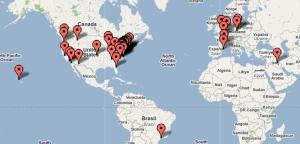Old Media, New Media
There’s no getting around it. Last week was big, in many ways. Big emotion. The tributes and memories of Robert left many, including us, heartbroken. And big numbers: a battalion of new readers here, no doubt driven by Paul Duggan’s good work in the Post, combined with other media outlets mentioned here.
A host of host of smaller sites are fueling additional traffic: an interesting site called Findadeath; we’re big in Germany, are seeing growth in the UK, have a regular readers in Iraq, South America and Asia.
But we’re pushing forward, with eyes set on May 2010, and there’s one remaining big item needing to be addressed before moving on. Namely, the first-time decision of the Post to run a so significant a story only online.
Erik Wemple of the Washington City Paper was the first to step into this journalistic debate with his dissection of the Post‘s decision not to publish a word of the Wone saga in print, but reserve it all for the web. 
 Wemple offers Duggan deserved praise for the project while questioning why it was only available for online readers. Writes Wemple:
Wemple offers Duggan deserved praise for the project while questioning why it was only available for online readers. Writes Wemple:
“Keeping the story out of the paper also expresses a certain amount of news arrogance on part of Post leaders. It’s as if they think that all the stuff that occupies the 16-or-so pages in the front section is just so precious that it cannot possibly be preempted for something, well, far more interesting and readable.”
Arrogance, or smart business? That’s the question raised Sunday by the Post’s ombudsman, Andrew Alexander. An “…intriguing, vexing whodunit…” he admits the decision to keep online only clearly vexing many subscribers. Alexander quotes Bill Mitchell, with the well-regarded Poynter Institute, as saying on balance it was the right decision. But he then goes further:
“‘Murder on Swann Street’ was a hit online. It made the Web site’s “Most Viewed Articles” list on Monday and Tuesday. But it alienated quite a few print-only readers in the process.
Privately and publicly, some Post staffers have questioned the decision. On balance, I think editors made the right call.
The affluent and educated Washington market is unique. Post research shows that most area households have computers and that nearly 80 percent have broadband access. Even among households where The Post is read only in print, 86 percent have a computer and 81 percent accessed the Internet in the past 30 days. So while those readers may not like to read online, they have the capability.”
Forgive our naivte, but something strikes us as odd about this defense. Specifically: incomplete.
Let’s be honest. Duggan managed to add several bits of new information (the 9-1-1 call, the history of how Price, Zaborsky and Ward met) but overall trod lightly on the more disturbing aspects of the evidence. Did putting these elements into print cause a bit of a shudder among the Post’s editors? Moreover, since when did Robert Wone’s murder become the subject of interest merely for DC’s affluent and educated?
Any attention brought to this case is well deserved; we have only interest and appreciation for the work of other journalists and bloggers working to bring light to a murky situation. But Duggan’s work is neither a starting or ending point.
It’s our intent, with your help, to continue pushing on the many unsolved aspects of Robert Wone’s murder. There’s a lot of ground to cover and nearly a year to complete our task. That’s where the increasing reader base comes in. There’s a relatively large audience interested in finding justice in this case, and you bring a spectrum of experience. Everyone has something to contribute.
Which brings us to the map. The Post, WSJ, ATL carried the Wone case far and wide, but the viral and word of mouth promotion can pay off too, across continents. Work your networks, ring your pal who loves CSI, Granny the Matlock fan, your uncle the attorney. Maybe you have medical or legal experience. Perhaps you know of another ‘unsolvable’ case that was broken open. Or something in one of the legal documents has raised a question.
A comment from new reader Mike last week bodes well for growth:
“I thought the FOIA idea was a great one. I am a lawyer as well but definitely not an expert on FOIA. Although I have taken training on the subject. I seem to remember an exemption that had to do with live criminal investigations. I think it was exemption 7. Maybe 7(a), (b), and/or (e)? I guess it would be a good idea to address these exemptions in any FOIA request that is submitted and argue against them applying.
Don’t want to go too much into my background, but I think I could lend a hand on analyzing any documents we received from custodial interviews.”
We need everyone’s help to try and do what the justice system has not yet been able to: bring resolution and clarity to the question who murdered Robert Wone. Let’s get to it.
– posted by Doug


gravatar test
It works. Now get back to work.
–Doug, co-editor
No kitty or puppy? LOL